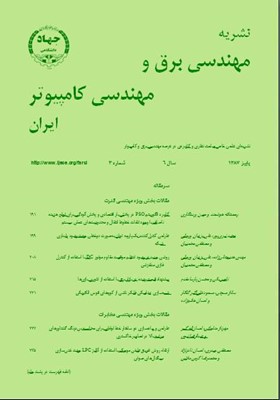پيشنهاد قيمت بهینه در بازار برق با استفاده از تئوری بازیها
محورهای موضوعی : مهندسی برق و کامپیوترناصر بائی 1 * , محسن پارسامقدم 2
1 - شرکت ABB
2 - دانشگاه تربیت مدرس
کلید واژه: بازارهای غیرمشارکتینقطه تعادل نَشالگوریتم ژنتیکپخش بار بهینه مستقیم (DCOPF),
چکیده مقاله :
در این مقاله روش جدیدی برای استراتژی پیشنهاد قیمت در بازارهای نقطهای برق ارائه شده است. یک روش بهینهسازی دوسطحی برای حداکثرسازی سود شرکتهای غیرمشارکتی، با در نظر گرفتن تمام قیود شبکه به کار رفته است. در این روش نقاط تعادل بازار به عنوان تعادل نَش محاسبه شدهاند. به منظور در نظر گرفتن رفتار تمام شرکتهای بازار و در نتیجه محیط رقابتیتر، هم تولیدکنندگان و هم مصرفکنندگان به عنوان بازیکنان بازار در نظر گرفته شدهاند. برای اجتناب از رسیدن به نقاط ماکزیمم محلی در بهینهسازی از روش الگوریتم ژنتیک استفاده شده است. روش پیشنهادی برای سیستم 9 شینه با نتایج رضایتبخش به کار رفته است.
This paper, presents a new approach for bidding strategy in spot electricity markets. A two-level optimization method is used for profit maximization of non-cooperative firms, while taking into account overall system constrains. In this approach, the market equilibrium points are determined as Nash Equilibria. In order to capture the behavior of all market participants and therefore, a much more competitive environment both the suppliers and consumers are considered as the players of the market. To avoid local maxima solutions, Genetic Algorithm based optimization is incorporated. The proposed method has been applied to IEEE 9 bus system with satisfactory results.
[1] W. Mielczarski, G. Michalik, and M. Widjaja, "Bidding strategic in electricity markets," in Proc. of the 1999 IEEE PES Power Industry Computer Application Conf., PICA’99, pp. 71-76. Santa Clara, CA, US, Jul. 1999.
[2] Z. Yu, F. T. Sparrow, T. L. Morin, and G. Nderitu, "A stackelberg price leadership model with application to deregulated electricity markets," in Proc. of IEEE Power Engineering Society 2000 Winter Meeting, vol. 3, pp. 1814-1819, Singapore, Jan. 2000.
[3] R. W. Ferrero, S. M. Shahidehpour, and V. C. Ramesh, "Transaction analysis in deregulated power systems using game theory," IEEE Trans. on Power Systems, vol. 12, no. 3, pp. 1340-1347, Aug. 1997.
[4] L. C. Teo, Gaming in Electricity Market, Undergraduate Thesis, University of Queensland, Queensland, Australia, 2002.
[5] G. A. Berry, B. F. Hobbs, W. A. Meroney, R. P. O’Neill, and, W. R. Stewart, "Analyzing strategic bidding behavior in transmission networks," IEEE Tutorial on Game Theory Applications in Electric Power Markets, Editor: H. Singh, IEEE PES, pp. 7-32, 1999.
[6] J. D. Weber and T. J. Overbye, "A two - level optimization problem for analysis of market bidding strategies," in Proc. of IEEE Power Engineering Society 1999 Summer Meeting, vol. 2, pp. 682-687, Jul. 1999.
[7] A. J. Wood and B. F. Wollenberg, Power Generation Operation and Control, John Wiley & Sons, Inc, Chapter 2, 1990.
[8] C. W. Richter and G. B. Sheble, "Genetic algorithm evolution of utility bidding strategies for the competitive marketplace," IEEE Trans. on Power System, vol. 13, no. 1, pp. 256-261, Feb. 1998.
[9] C. W. Richter, G. B. Sheble, and D. Ashlock, "Comprehensive bidding strategies with genetic programming/finite state automata," IEEE Trans. on Power Systems, vol. 14, no. 4, pp. 1207-1212, Nov. 1999.
[10] P. F. Correia, The Use of Noncooperative Games to Determine Strategic Bidding in Centralized Electricity Markets, Ph. D. Dissertation, Univ. Illinois at Urbana - Champaign, Dept. Electrical Comput. Eng., Appendix A, pp. 104-107, 2002.

